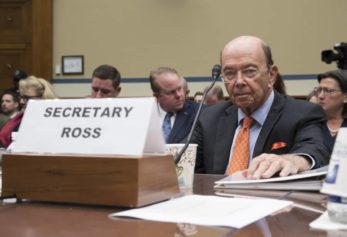To make the point that Mississippi no longer needed to be scrutinized under a provision of the Voting Rights Act, during Wednesday’s Supreme Court arguments Chief Justice John Roberts implied that Mississippi does a better job with black voter turnout than Massachusetts — angering officials there who accuse him of using inaccurate data to make a misleading point.
Massachusetts Secretary of State William Galvin pointedly took issue with Roberts for building his argument that Section 5 of the Voting Rights Act is no longer necessary by using Massachusetts as his foil.
“We have one of the highest voter registrations in the country,” Galvin said, according to the Boston Globe. “So this whole effort to make a cheap-shot point at Massachusetts is deceptive.”
The issue before the court, in a challenge by Shelby County, Alabama, to Section 5 of the Voting Rights Act, is whether the bitter racism of the South has changed enough for the nine states under the jurisdiction of the provision to be freed from oversight by the U.S. Justice Department.
Section 5 mandates that officials in a “covered” jurisdiction must prove to the satisfaction of federal officials that a “proposed voting change does not deny or abridge the right to vote on account of race, color, or membership in a language minority group.”
Nine states are completely “covered” by the section: Alabama, Alaska, Arizona, Georgia, Louisiana, Mississippi, South Carolina, Texas and Virginia. Five other states have certain counties covered, and two states have only certain townships covered.
During the oral arguments, Roberts appeared to sound like the voice of authority as he made his factually flawed argument about Massachusetts.
“Do you know which state has the worst ratio of white voter turnout to African-American voter turnout?” Roberts asked Donald Verrilli Jr., solicitor general for the Department of Justice, during Wednesday’s arguments, according to the court transcript.
“I do not know that,” Verrilli answered.
“Massachusetts,” Roberts responded. He then said even Mississippi has a narrower gap.
Roberts went back to the issue a bit later, asking Verrilli if he knew which state has the greatest disparity in registration.
“Massachusetts,” Roberts responded again.
But Galvin said the chief justice is wrong.
“I’m calling him out,” Galvin said. “The concept of black communities in Massachusetts not voting is an old slur, and it’s not true. I guess the point [Roberts] is trying to make is Mississippi is doing so much better they don’t need the Voting Rights Act. He can still relay that conclusion, but he shouldn’t be using phony statistics. It’s deceptive, and it’s truly disturbing.”
A Supreme Court spokeswoman would not offer supporting evidence of Roberts’ view, referring a reporter to the court transcript.
After the arguments, Massachusetts officials and political scientists went in search of data that could possibly support Roberts’ contention. They concluded that he was likely going on U.S. Census Bureau data known as “The Current Population Survey,” which collects information on voting and registration every other year. It is one of the few national databases, if not the only one, providing state-by-state voting information.
But according to the Boston Globe, a review of the census data contradicts Roberts, showing states such as Washington, Arizona, and Minnesota with similar if not larger gaps between black and white voters than Massachusetts.
Political scientists say the black populations in many states are too small to make sweeping conclusions about turnout because the margin of error is so high.
The black population in nearly one-fourth of states surveyed in 2010 was so small that it was not possible to make statistically reliable comparisons. And the margin of error for nearly another quarter of the states, including Massachusetts, was in the double digits.
“The margin of error is huge,” Michael P. McDonald, a professor of government and politics at George Mason University who specializes in American elections, told the Boston Globe. “They’re not reliable numbers.”
“It’s just disturbing that the chief justice of the United States would spew this kind of misinformation,” Galvin told Politico.
James Jennings, a professor at Tufts, called it “disingenuous” to compare elections in Massachusetts and Mississippi because they take place in different contexts. The two states have a different set of challenges based on region, history and populations.
As an example, he pointed to the election of Elizabeth Warren to the U.S. Senate. He said Warren courted voters of color in Massachusetts, but in the 2010 special election to fill the seat of the late Edward M. Kennedy, Republican Scott Brown and Democrat Martha Coakley did not.
“They both ignored black and Latino voters,” Jennings said, making the gap between whites and blacks wider in that election.
Galvin implied to Politico that Roberts’ decision to single out Massachusetts might have had other motivations.
“I would only note, and maybe this may explain it in some fashion, and I don’t want to do say it does … at least two of the justices on the other side have deep Massachusetts connections: Breyer is a Massachusetts resident and Kagan is the former dean of Harvard Law School, so whether that played into that, I don’t know,” he said.
